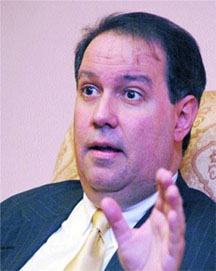Few people in the English speaking Caribbean will know the name of Felipe Vicini, the Executive President of Grupo Vicini, the Dominican Republic conglomerate that is engaged in everything from energy to agriculture. Yet his recent joint venture announcement contains important messages for the whole of Cariforum as it makes clear that the region can become a base for global enterprise; that the private sector can bring economic benefit and employment; that significant economic initiatives rest as much with companies as governments; and that there are positive ways in which government and business can work together.
On February 23, Mr Vicini made public that his group and the Indomina Group had entered into a partnership agreement with Pinewood Studios in the United Kingdom to operate and manage a huge new state-of-the-art film and television facility in the Dominican Republic.
Located in Juan Dolio on the Dominican Republic’s southern coast about 40 miles east of Santo Domingo, Pinewood Indomina Studios, as the venture will be known, will produce film, TV, and other related media content to service the fast growing visual entertainment sector in the Americas.
 The project, which involves the construction of four sound stages and ancillary full-service support facilities covering 216,000 sq ft within a 27.4 acre site, is to become operational in early 2012.
The project, which involves the construction of four sound stages and ancillary full-service support facilities covering 216,000 sq ft within a 27.4 acre site, is to become operational in early 2012.
The investment is intended to bring a wide range of new skills to the Dominican Republic as Indomina’s transmedia approach involves grouping together in one location the many high-tech skills now needed to produce and distribute motion pictures, television programmes, music, and interactive games. As such it will in addition to filming be engaged through its studio facilities and production services in developing the computer generated imagery that is at the heart of modern movie-making.

The studio investment will also facilitate the development of a wide range of new IT and other skills in the Dominican Republic. So much so that the company recognises that it must develop a parallel educational component in the form of a practical and vocational school to develop local technology and technical skills. In this respect in January the country’s President, Leonel Fernandez, visited India to develop a better understanding of the ways in which it has developed the skills necessary to create a globally successful movie industry.
While there he was received at the country’s International Cinematography Institute, Whistling Woods, which offers post-graduate MBA degrees in the production of television series, cinematography direction, design and taping of sound, and other skills. During the visit he also met with the most important animation studio in India, Crest Animation, which has been hugely successful supplying its services to Hollywood.
According to reports, the President’s objective was to encourage Indian companies to work with the new Dominican film industry to take advantage of the Republic’s proximity to the US and to train Dominicans locally in the production of animated films.
The new Dominican Republic company is aimed at the rapidly growing entertainment market in the Americas and will in part focus on the US$2.7 billion Caribbean, Central and South American market, placing an emphasis on the Hispanic and other communities in the Americas, producing everything from soaps to feature length movies. The investment was helped by the Dominican Congress passing late in 2010 a bill providing tax credits of up to twenty five per cent for feature films and TV series shot in the Dominican Republic.
Speaking about the joint venture at the ground breaking ceremony, Mr Vicini said that when creating a new investment his group always made sure that in doing so they provide a real basis for national development and by extension further growth. To achieve this, he said, it is essential to achieve a strong commitment from all of the parties involved, creating public-private partnerships that create opportunities for all Dominicans.
His comments point to what is lacking in much of the Caribbean; public-private partnerships, imbued with a sense of urgency, delivering private sector led development. There are many messages in what is now happening in the Dominican Republic for the rest of a region that has also been trying to develop a movie industry, so far with relatively little success. The first is that it is possible to attract high-tech based industries that create new skills and significant levels of employment in a manner that builds on a nation’s creative industries and domestic talent.
The second is that nations in the region can become a platform in the Americas for global industries.
Thirdly it is possible with leadership and the active involvement and enthusiasm of government and legislators working with strong private sector partners, to create a world class investment environment for a new industry. The fourth message is that by linking an investment with a sector that requires new skills and training, it is possible to envisage long term sustainability, as well as the creation of new skills and growth not just in the sector concerned, but in the wider economy.
The fifth is that the speed of decision-making in real time that is usual in the private sector needs to become common to governments.
And sixthly, that Caribbean nations can succeed in a time of recession in attracting investments that involve in attracting investment industries that are amongst the most competitive in the world.
In some parts of the anglophone Caribbean there is a suspicion of the Dominican Republic. In part this is because a lack of knowledge of the intentions of a much larger neighbour or of what creates the dynamism that exists in the Dominican economy. This, however, is not a view shared by business leaders in the larger enterprises in Caricom.
The creation of a world class film industry in the Dominican Republic ought to act as a spur for the business community of Caricom and the Dominican Republic to meet to consider whether there are ways in which they might begin to work together to create new investments across the region.
Previous columns can be found at www.caribbean-council.org









